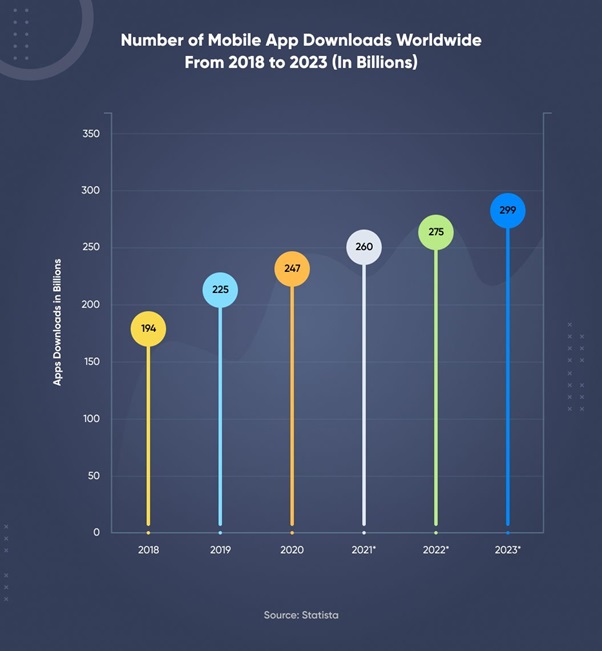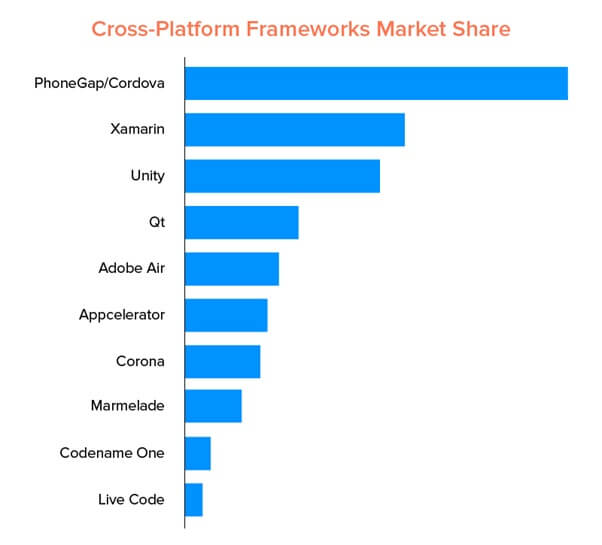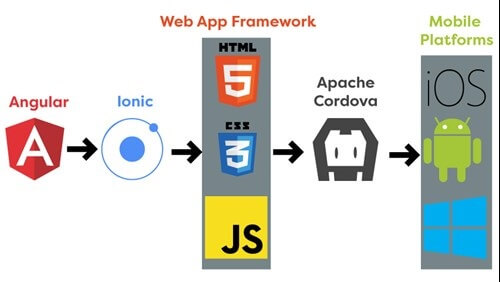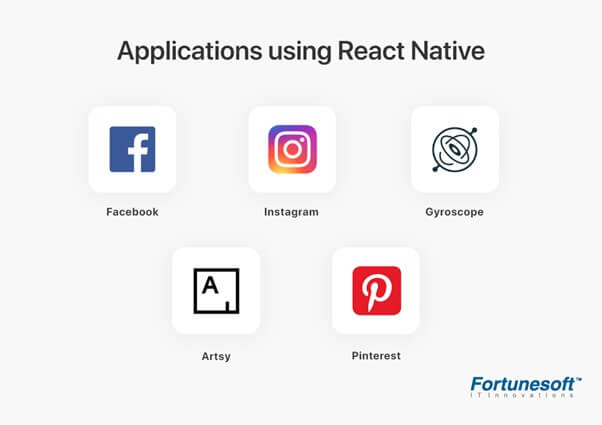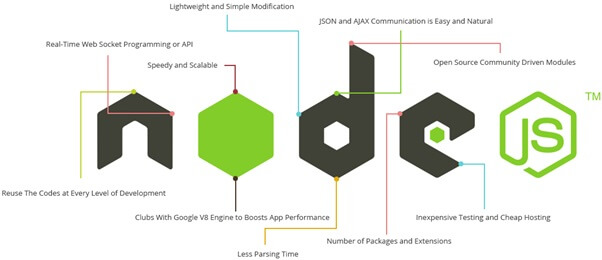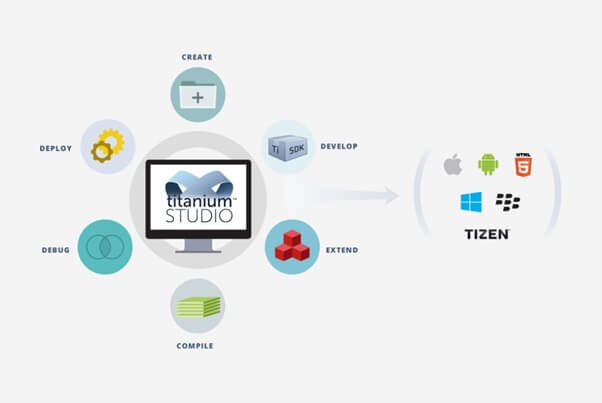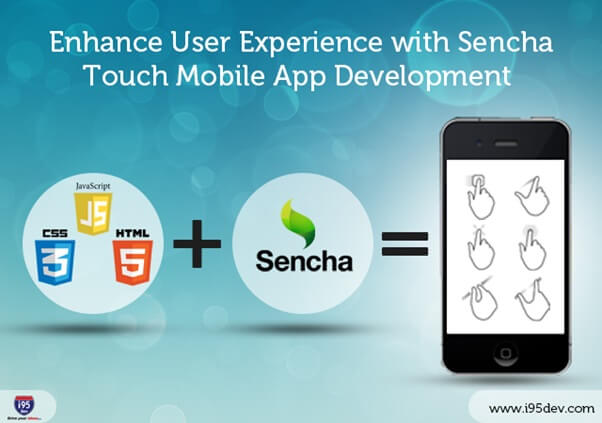Digital presence has become an important step to growing your business. It doesn’t matter in what sector or what scale your business belongs to, the thing that only matters is your online presence. With the Cross-Platform Frameworks, it has become a lot easier to grow your online presence and reach out to a target audience.
According to a report, 6 out of 10 small businesses are serving online. 47% of customers look for the online presence of the businesses from where they are planning to buy to check the reviews and recommendations.
In such a scenario the business can’t afford to lose its online presence on platforms like Apple App Store and Google Play Store. In a report by TrendForce, the global market share of mobile is valued at 1.39 billion in 2022, which will be a 3.8% yearly growth.
Business wants to penetrate deeper into the markets by developing highly intuitive and engaging mobile applications and increased revenue.
In today’s rapidly advancing technology, you need a strong Cross-Platform framework to develop a secure and user-friendly application.
Our many international clients demand cross-platform application development, as this helps them to get larger benefits in their business and helps them to save a large amount.
It is estimated that in 2023, the total number of application downloads will be 299 billion, up from the approx 247 billion global application downloads in 2020.
What is Cross-Platform Application Development?
A Cross-Platform Application development aims to create a single application that runs identically on various platforms. It uses platform-agnostic technology like HTML and CSS that helps businesses to cover many end devices at a very minimal price.
It is one of the popular methods used for application development. Many top mobile application development companies unlike Andolasoft use this framework.
Difference between Native and Cross-Platform App Development
As there are two app-building approaches to develop mobile solutions, i.e. – Native and Hybrid/ Cross-Platform.
Both have their benefits and challenges that will be suitable for your project depending on your needs and scenario.
The Native development relies on the programming languages and tools that are designed particularly for one platform. These are designed for a particular device and operating system.
Whereas the Cross-Platform development aims to develop a single application that will run identically on various platforms. It ensures hassle-free implementation, affordable production, and robust functionality.
Why Choose Andolasoft Cross-Platform Application Development?
Mobile applications have become an important element in growing your business. It is because of the growing number in the digital customer base. With mobile applications, businesses can grow rapidly by developing an instant connection with the target customers.
We at Andolasoft are experts in developing cross-platform applications in platforms like Flutter, Xamarin, PhoneGap, and more.
We have worked with many customers in various domains such as retail, hospitality, education, Fintech, and more. Our experienced mobile app developers convert your ideas into reality by using the latest tech stacks.
Never miss an update from us. Join 10,000+ marketers and leaders.
In this blog, I have listed the top 10 cross-platform app development frameworks that you can use in your business mobile application development.
Here you go,
1. Ionic:
Ionic is one of the best hybrid application frameworks because it bridges the properties that are in demand. It allows the developers to use a combination of languages, such as HTML5, CSS, Cordova, and JavaScript to access the native platform controllers.
Features:
- It is an Open Source front-end framework. It allows alterations of the code structure that is suitable for each developer and saves lots of time.
- It is based on AngularJS, which makes it easier to offer extensions to HTML’s Syntax, with core functionalities to imbibe the most useful yet attractive features and components in your applications.
- The ionic framework uses Cordova plugins that enable access to devices with inbuilt features that include GPS, Camera, and Audio Recorder. It is one of the major benefits of Cross-platform development tools.
- Ionic (mobile app framework) gives a native-like feel to the application which makes it the favorites among developers. With this framework, the developers can perform perfectly on various platforms.
Benefits:
- In the Ionic framework, you can get access to many ready-to-use UI components.
- The developers should know Angular, CSS, HTML, and JavaScript to develop applications using Ionic.
- The Ionic framework is mostly designed for mobile OS because it is based on the SAAS UI framework.
- As it is an Open- Source- front-end framework, it enables the developers to change the code according to their requirements.
Challenges:
- It consists of several unstable native plugins
- Applications that have lots of graphics and animations are not suitable to develop using the Ionic framework.
- With the Ionic framework, debugging becomes quite difficult
Developers Tool:
- Firebase
- Visual Studio Code
- Ionic app flow
Are you looking for an Ionic developer
2. React Native:
When you talk about a Cross-platform framework, it is difficult to not include React Native language. It is a framework, built on JavaScript. It is used to write neat code and gives a Native -like feel to your mobile application, which works easily on both iOS and Android.
Features:
- React Native is an Open- Source cross Platform app framework, the same as ionic, for which it has a large community of support that helps in supporting and fixing the bugs, improving and introducing more advanced features.
- It requires one-time coding to develop applications for diverse platforms like iOS and Android.
- React Native framework is highly compatible with third-party plugins like Google Maps.
- It focuses on UI to a greater extent rendering a highly responsive interface. The React Native language eliminates the time taken for loading and delivers a smooth interface for the applications.
Benefits:
- React Native focuses on the UI, which enables the developers to create a highly responsive UI interface.
- It is a leading cross-platform mobile application development framework, the developers need to code only once in React native. With the one-time coding, the application can run on diverse mobile OS platforms like iOS and Android.
- It has a large developer community that helps the developers to get adequate support in times of distress during application development projects.
- It is compatible with all the leading third-party plugins like Google Maps.
- You can develop mobile applications for different iOS and Android platforms like macOS, tvOS and Android TV, etc. Also, React Native can be instrumental to develop immaculate applications for Windows and UWP.
Challenges:
- Lots of performance issues were observed during the React Native Development.
- With the abstraction layer present in this framework, if any bug occurs then it can cause an unexpected bug in the whole application
Developers Tool:
- JS Editor
- Emulator, Android Studio, SDK
- Xcode
Are you looking for a React Native developer
3. Flutter:
Flutter framework has created a different image in the present-day market. As it is an Open-Source- cross- Platform app framework that was first released in May 2017 by Google.
Features:
- Flutter programming Language promotes portable GPU that renders UI power which allows it to work on the latest interfaces.
- It does not require updating the UI contents manually, because it holds a reactive framework. The Flutter App Developers only need to update the variables and the UI changes get visible after that.
- With the Flutter framework, the developers can automatically remake a widget tree and comprehend its cost adjustments.
- The Flutter mobile application development language has an inbuilt graphic engine. This makes it easy for the developers as they wouldn’t have to make any separate interfaces for iOS and Android.
Benefits:
- As flutter has an inbuilt graphic engine, the developers don’t have to create separate interfaces for iOS and Android.
- Using Dart, the developers get to write more structured programming codes. This makes it easier to maintain synchronized hierarchical structures even when writing complex applications.
- The Flutter Cross-Platform app framework uses GPUs that enable UI power. This makes it easier for the developers to work on the latest interfaces.
Challenges:
- Not stable
- Lacks several advanced features
- Comparatively new dart
- The dart has few features and the existing ones are not properly refined.
Developer’s tool:
- VS Code
- Emacs
- Android Studio
Are you looking for a Flutter developer
4. Xamarin:
Xamarin was developed as an independent platform, which was developed in the year 2011, before being acquired by Microsoft. As it is an Open- Source Cross-Platform applications framework that has characteristics that make it unique from other applications.
Features:
- The application developed on the Xamarin Framework are developed using c# which is a modern class platform application development language with the leverage to Objective-C and Java.
- It supports a direct inclusion of Objective-C, C++ libraries, and Java. It allows the developers to reuse third-party codebases that are encrypted in Java, C++, and Java.
- It reduces the cost and time of mobile app development, for it supports the WORA (write once, Run anywhere) and has various class libraries.
- It offers robust compile-time checking. With this facility, the developers witness fewer run-time errors and get well-functioning applications.
Benefits:
- It uses C# along with with.NET framework for mobile application development for any platform.
- It provides continuously improved performance to match the native development standards.
- With the Xamarin framework, you can get lots of learning resources
- It offers an optimal user experience because of its UI-specific elements.
Challenges:
- It faces many compatibility issues, using third-party tools and libraries.
- There is a need for basic knowledge of native languages to use this framework.
- It offers limited access to Open Source libraries.
Are you looking for a Xamarin developer
5. NodeJS:
NodeJS framework is one of the incredible cross-platform frameworks used for developing cross-platform applications. However, the NodeJS framework is a JavaScript runtime framework developed on the Chrome V8 JavaScript engine.
It is an open-source environment that supports the development of server-side and scalable networking applications.
Features:
- The entire NodeJS API is asynchronous, it signifies that these are non-blocking in nature, which defines the servers are based on the NodeJS and it doesn’t essentially wait for the data from APIs.
It automatically moves on to another API after calling it, which works as a notification mechanism for NodeJS. It allows the server to get a response from the previous API.
- JS library is very much speedy in its code execution process, as it is built on Chrome’s V8 engine.
- It does not buffer, however, it outputs the data in chunks.
- It delivers smooth and perfectly functioning applications. NodeJS uses a single-threaded model with the event looping functionality. This mechanism enables the server to reply in a non-blocking format, making them more scalable.
Benefits:
- JS framework has a large developers community
- It reduces the response time for slow requests and every developer can execute the database queries simultaneously.
- V8 engine present in NodeJS is the fastest dynamic language interpreter, which is constantly pushing the boundaries.
- NodeJS offers a smooth and even application because it uses a single-threaded model.
Challenges:
- Excessive memory usage
- Unresponsive applications, such as hanging or looping
- Bad performance
- Various functional issue
Developer’s Tool:
- io
- PM2
- Babel
- JS
- Meteor
Are you looking for a NodeJS developer
6. PhoneGap:
PhoneGap (Cordova) is an impeccable cross-platform framework used for mobile application development. It uses HTML5, CSS and JavaScript. It offers cloud solutions to developers by providing them the choice for sharing the application in the development process to get feedback from many other developers.
Features:
- It enables the developers to develop cross-platform applications by using the existing web technologies like CSS3, HTML5, and JavaScript.
- It supports the use of a single code base to develop applications for various platforms like iOS, Android, Blackberry, and Windows Phone.
- As it uses an architecture that is plugin-able. This makes it possible to access all the native device APIs and it can be extended in a modular way.
Benefits:
- It allows the users to use embedded payment systems like App Store and Google Play Store through the PhoneGap Cross-Platform App framework.
- It provides the luxury to use JavaScript and other libraries like Sencha Touch, MooTools, etc. to manage all the interactions in the applications.
- The applications that are developed with PhoneGap run very consistently on every leading OS platform that shows very minimal differences.
Challenges:
- It is not suitable for an app that has several graphic elements
- PhoneGap framework lacks descriptive documentation which is crucial for application development
- It lacks support for plugins that have hooks.
- PhoneGap language cannot be used for gaming applications.
Are you looking for a PhoneGap developer
7. Appcelerator Titanium:
Appcelerator Titanium is an Open-Source Cross-Platform application native app development framework. It was developed in 2008. Its core features are, it includes API to access native UI, many device functionalities, and MVC framework functionality.
Features:
- It offers various tools that are used for rapid application development. It indicates that a prototype can be developed within very little time and effort that evaluates the users to interact with UI.
- It processes pre-built connectors that are available for MS azure, Salesforce, MS SQL, the list is however very long.
- It consists of ArrowDB- a scheme-less data store that allows developers to deploy several data models without putting any extra effort into setup.
Benefits:
- It has a pre-built connector for Box, MSSQL, MS Azure, and Salesforce
- It has various tools that make the development process faster.
Challenges:
- Application Complexity increases
- It limits the flexibility, as strange bugs and limitations increase.
Developer’s Tool:
- Appcelerator CLI
- Amplify
Are you looking for an Appcelerator developer
8. Sencha Touch:
The Sencha Touch helps to accelerate the hardware techniques. If you are looking for inbuilt Cordova integrations, then the Sencha touch cross-platform application works best.
Features:
- It is famous to develop built-in native-looking themes for many, major platforms like Blackberry, iOS, Android, windows phone, etc.
- It supports Cordova integration for the Native API access including the packaging.
- It provides code compatibility between old and new ones.
- It comes with 50+ built-in UI widgets. It also has several collections of rich UI like Forms, Menus, carousels, and toolbars, etc., that are specifically developed for mobile platforms.
Benefits:
- It consists of more than 50 in-built and customized UI designs along with a rich UI collection.
- It supports Cordova integrations, which makes it a lot easier to access the native APIs including the packaging.
- It provides an impressive backend data package
Challenges:
- The API designed with Sencha Touch does not give access to the contact, camera, and accelerometer of the device
- It doesn’t allow push notification
Developer’s tools:
- App Inspector for Sencha
Are you looking for a Sencha developer
9. Corona SDK:
If you want to develop immaculate two-dimensional mobile applications for various leading platforms, then Corona SDK is the right choice. It is an open-source- cross-platform application framework that renders 10X faster mobile games and better application development services.
Features:
- It is a multi-faceted and lightweight programming language LUA.
- It is used to develop gaming applications for various platforms like desktop, connected TV, iPad, etc.
Benefits:
- It offers several plugins for media, analytics, in-app advertising, and several other things.
- The developers can see the code changes in real-time as the cross-platform app framework responds to instant changes.
- As it is based on the programming language LUA, it makes the framework more powerful and fast.
Challenges:
- As it uses the Programming language LUA, which is a scripting language, for which you won’t be writing the native language
- You won’t get the facility to use advanced and luxury technology
Developer’s Tool:
- Xcode
- Android Studio Project
Native Script:
Native Script is an amazing free Cross- platform Framework, which is based on JavaScript. It will not be wrong to say that NativeScript is a preferable choice for many developers who want a WORA functionality.
Features:
- NativeScript offers accessible, beautiful, and platform-native UI, and without the web views. Developers are required to define once and this let’s the NativeScript runs everywhere
- The NativeScript developers get complete web resources which come with loaded Plugins for every kind of solution.
Benefits:
- NativeScript developers can write the platform based APIs in JavaScript only.
- It supports components like AndroidArsenal, Cocoapods and calls these native methods from libraries.
- It comes with all types of Plugins that eliminates the use of any third-party Plugins
- It is a beautiful platform Native UI that can be accessed without the web views.
Challenges:
- The NativeScript apps are larger than native apps
- It has some buggy open source Plugins
Developer’s Tools:
- CLI NativeScript
FAQ:
1. What frameworks are used for cross-platform development?
There are several frameworks used for cross-platform web development. Some of the popular cross platform frameworks are :
- React Native
- Flutter
- Xamarin
- Ionic
- PhoneGap
2. How does a cross platform framework work?
A cross-platform framework helps to develop apps that are more compatible with major OS: iOS, android, windows, MacOS and windows. It is an alternative to many native app developments. It uses one app code for different platforms.
3. How does a business benefit through cross- platform app development?
A business can benefits through cross platform app development in any ways such as:
- Save lots of time and money
- It provides high security and authentication
- Cross platform allows automatic update
4. What the challenges are of cross platform application development?
The major challenge faced by developing a multi-platform application development framework is “how to manage the codebase”. As each platform needs a unique code, which means separate development and extra time required for each platform.
I’ve worked with the team at Andolasoft on multiple websites. They are professional, responsive, & easy to work with. I’ve had great experiences & would recommend their services to anyone.
Ruthie Miller, Sr. Mktg. Specialist
Salesforce, Houston, Texas

Conclusion:
The above-mentioned list defines the top cross-platform application frameworks, which play a vital role in redefining your app development process.
I think now it will lot easier for you to choose the right platform for your application development after knowing the top ten cross-platform frameworks features.
You can seek the help of an expert mobile application development company, like Andolasoft. We hold 13 years of experience in application development. Our dedicated developers work effortlessly to provide a better cross-platform application that will fulfill all your requirements. If you are planning to develop a cross-platform mobile application for your business or you have ideas, then feel free to discuss them with us. We are here to help you with your quires.
Share your comments below if you have more information on cross-platform application frameworks.

